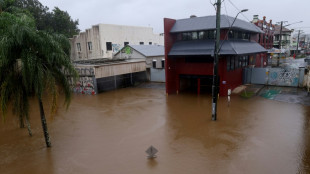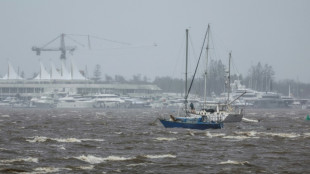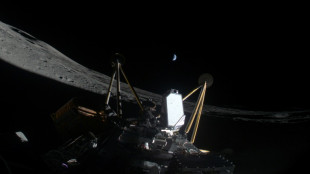
-
 Black comedy from award-winning 'Parasite' director tops N.America box office
Black comedy from award-winning 'Parasite' director tops N.America box office
-
EU chief sees US as 'allies' despite 'differences'

-
 French research groups urged to welcome scientists fleeing US
French research groups urged to welcome scientists fleeing US
-
Journalist quits broadcaster after comparing French actions in Algeria to Nazi massacre

-
 Highlights from Paris Women's Fashion Week
Highlights from Paris Women's Fashion Week
-
US ends waiver for Iraq to buy Iranian electricity

-
 China-US trade war heats up with Beijing's tariffs to take effect
China-US trade war heats up with Beijing's tariffs to take effect
-
Greenland's Inuits rediscover their national pride

-
 Floods, mass power cuts as wild weather bashes eastern Australia
Floods, mass power cuts as wild weather bashes eastern Australia
-
Wild weather leaves mass blackouts in Australia

-
 China consumption slump deepens as February prices drop
China consumption slump deepens as February prices drop
-
Phone bans sweep US schools despite skepticism

-
 Some 200 detained after Istanbul Women's Day march: organisers
Some 200 detained after Istanbul Women's Day march: organisers
-
'Grieving': US federal workers thrown into uncertain job market

-
 Remains of murdered Indigenous woman found at Canada landfill
Remains of murdered Indigenous woman found at Canada landfill
-
Women will overthrow Iran's Islamic republic: Nobel laureate

-
 Women step into the ring at west African wrestling tournament
Women step into the ring at west African wrestling tournament
-
Trump's tariff rollback brings limited respite as new levies loom

-
 Hackman died of natural causes, a week after wife: medical examiner
Hackman died of natural causes, a week after wife: medical examiner
-
Oops, we tipped it again: Mission over for sideways US lander

-
 Cyclone Alfred downgraded to tropical low as it nears Australia
Cyclone Alfred downgraded to tropical low as it nears Australia
-
Global stocks mixed as Trump shifts on tariffs weighs on sentiment

-
 Trump says dairy, lumber tariffs on Canada may come soon
Trump says dairy, lumber tariffs on Canada may come soon
-
Trump cuts $400 mn from Columbia University over anti-Semitism claims

-
 US Fed chair flags policy uncertainty but in no rush to adjust rates
US Fed chair flags policy uncertainty but in no rush to adjust rates
-
Adopted orphan brings couple 'paradise' in war-ravaged Gaza

-
 Oops, we tipped it again: Mission over for private US lander
Oops, we tipped it again: Mission over for private US lander
-
Greenland's mining bonanza still a distant promise

-
 Pope 'stable' as marks three weeks in hospital with breathless audio message
Pope 'stable' as marks three weeks in hospital with breathless audio message
-
Shares slump on Trump tariffs tinkering, jobs

-
 Mission over for private US lander after wonky landing
Mission over for private US lander after wonky landing
-
Thousands stranded as massive WWII bomb blocks Paris train station

-
 UK court cuts longest jail terms on activists, rejects 10 appeals
UK court cuts longest jail terms on activists, rejects 10 appeals
-
US hiring misses expectations in February as jobs market faces pressure

-
 S.Sudan heatwave 'more likely' due to climate change: study
S.Sudan heatwave 'more likely' due to climate change: study
-
US company says Moon mission over after landing sideways again

-
 Trump says farmers keen to quit 'terrible' S. Africa welcome in US
Trump says farmers keen to quit 'terrible' S. Africa welcome in US
-
US stock markets rise as investors track Trump tariffs, jobs

-
 US hiring misses expectations in February, jobs market sees pressure
US hiring misses expectations in February, jobs market sees pressure
-
Disco, reggae on King Charles's 'eclectic' Apple playlist

-
 Australian casino firm strikes deal to avoid liquidity crunch
Australian casino firm strikes deal to avoid liquidity crunch
-
Deposed king's grandson makes low-key return to Egypt

-
 Stock markets, bitcoin down as Trump policies roil markets
Stock markets, bitcoin down as Trump policies roil markets
-
Bangladesh student leader aims to finish what uprising began

-
 Japan, Britain stress free trade in Tokyo talks
Japan, Britain stress free trade in Tokyo talks
-
Spain targets men's 'deafening silence' in gender violence battle

-
 Spain under pressure to abort nuclear energy phase-out
Spain under pressure to abort nuclear energy phase-out
-
Hungary femicide sparks outcry on gender violence

-
 Trial of Maradona's medics to start four years after star's death
Trial of Maradona's medics to start four years after star's death
-
Women spearhead maternal health revolution in Bangladesh


Whale strandings: Five questions answered
The death of about 200 pilot whales at a Tasmanian beach has renewed questions about what causes such mass strandings and whether they can be prevented.
With the help of Karen Stockin, a whale stranding expert at New Zealand's Massey University, here are the answers to five key questions:
What causes mass strandings?
Scientists are still trying to work that out. They do know that there are multiple types of stranding events, with several explanations that can overlap. The causes can be natural, based on bathymetry -- the shape of the ocean floor -- or they can be species-specific.
Pilot whales and several smaller dolphin species are known to regularly mass strand, especially in the southern hemisphere, according to Stockin. In some instances, a sick whale headed towards shore and a full group unwittingly followed them.
Does it happen in certain areas?
There are a few global hotspots. In the southern hemisphere, Tasmania and New Zealand's Golden Bay have seen several instances, and in the northern hemisphere, the United States bay of Cape Cod, Massachusetts, is another hotspot.
In those areas, there are similarities between the topography of the beaches and environmental conditions. For example, Cape Cod and Golden Bay share a prominent narrow coastal land feature and shallow water with large tidal variations. Some people call such areas "whale traps" because of the speed at which the tide can recede.
Are strandings becoming more common?
Possibly. Strandings are natural phenomena and have been documented since the days of Aristotle. The health of the oceans has, however, deteriorated in recent decades.
Strandings could become more common as human use of the seas, shipping traffic and chemical pollution all increase.
Epizootic diseases -- outbreaks of sickness that affect a specific animal species -- could also lead to more. But there is still much to understand about the phenomenon, Stockin said.
Is climate change a factor?
Research on how climate change is affecting marine mammals is still in its infancy. Experts know that climate change can give rise to changes in prey and predator distribution. For some species, this may result in whales coming closer to shore.
For example, recent research based on current climate prediction models suggests that by the year 2050, the distribution of sperm whales and blue whales in New Zealand could vary considerably.
Can strandings be prevented?
Not really. As strandings occur for a multitude of reasons, there is no one-size-fits-all solution. But Stockin said that by better understanding whether and how human-induced changes are causing more mass strandings, solutions could be found.
Y.Ponomarenko--CPN
